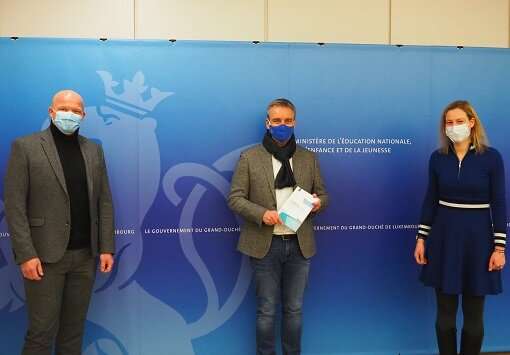Alex Kockhans, Director of the Centre pour le développement des apprentissages Grande-Duchesse Maria Teresa (CDA), the Minister of Education, Children and Youth, Claude Meisch and Sonja Ugen, Research Scientist at the Luxembourg Centre for Educational Testing (LUCET) of the University of Luxembourg. Credit: MENJE
The University of Luxembourg, the Centre pour le développement des apprentissages Grande-Duchesse Maria Teresa (CDA) and the Minister of Education, Children and Youth, Claude Meisch presented a new publication on learning disabilities in multilingual contexts on Monday 18 January 2021. The handbook "Lernstörungen im multilingualen Kontext: Diagnose und Hilfestellungen" is the first result of a joint collaboration between the University of Luxembourg and the Centre pour le développement des apprentissages Grande-Duchesse Maria Teresa (CDA) and focuses on the results of a study of the (standardized) assessment tools currently used in Luxembourg to diagnose specific learning disorders. The results of the study are based on interviews and questionnaire data collected from practitioners at the local, regional and national levels.
Diagnostical challenges in the multilingual Luxembourg school context
In Luxembourg's traditional public schools, classes are taught in several languages. Luxembourgish is the main teaching language in the first cycle of primary school, whereas German is the primary teaching language from the second cycle on, as children learn how to read, write and calculate in German. Most students, however, learn German as a language in parallel to acquiring literacy and mathematical skills. In addition, the student population is multilingual, only about 35% of the overall number of students attending traditional public schools speak Luxembourgish as their first language.
There are currently few diagnostic tools available that consider the characteristics of Luxembourg's multilingual school context. Most tests in use have been developed in German-speaking countries for native-German-speaking children and rarely contain adaptations for children with German as their second or third language. As a result, practitioners need to compromise when administrating such tests, which jeopardizes the objectivity of the diagnostic process. Moreover, to provide the most appropriate support, it is crucial to determine whether potential learning difficulties can be attribute to specific learning disorders or whether they are rather due to insufficient language skills.
A handbook taking into account the specificities of the Luxembourg's school system
This handbook contains a theoretical and a practice-oriented part. It describes the current state of research into specific learning disorders in general and within the Luxembourgish context and addresses further aspects to be considered in the diagnosis of specific learning disorders, such as intelligence, (neuro-)psychological capabilities and social-emotional behavior. It also provides an overview of existing pedagogical support and adaptive measures which can help children in their everyday school life and illustrates the process of diagnosing a specific learning disorder on two case studies in the areas of reading/writing and arithmetic. The handbook contains a variety of ideas concerning possible pedagogic and didactic support and adaptative tools aimed at teaching professionals, which may facilitate learning for children with learning difficulties in traditional public schools.
During a second phase of their collaboration, the University of Luxembourg and the CDA will focus on the development of specific tests tailored to the Luxembourg student population and the Luxembourg educational system to optimize the diagnostic process and to make adequate resources available to the specialists.
More information: The handbook is also available online on the Melusina Press platform on 26 January. DOI: 10.26298/bw1j-9202
Provided by University of Luxembourg






















